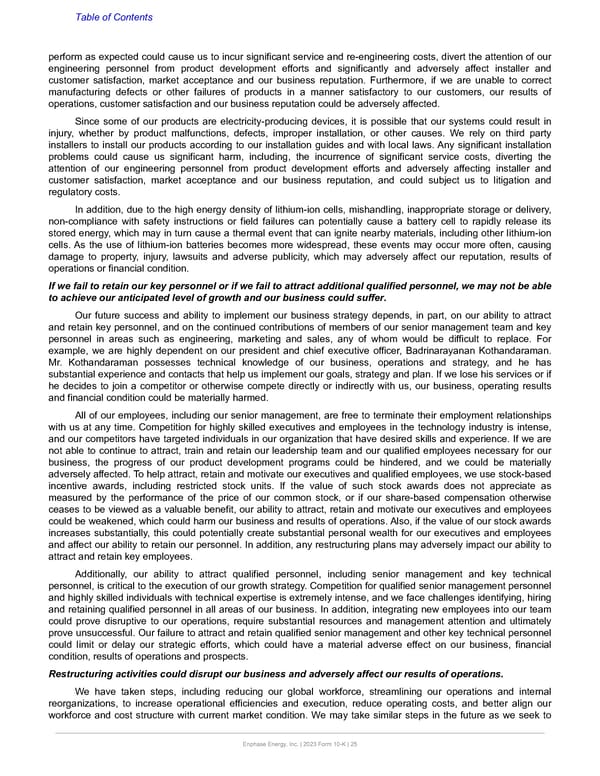Table of Contents perform as expected could cause us to incur significant service and re-engineering costs, divert the attention of our engineering personnel from product development efforts and significantly and adversely affect installer and customer satisfaction, market acceptance and our business reputation. Furthermore, if we are unable to correct manufacturing defects or other failures of products in a manner satisfactory to our customers, our results of operations, customer satisfaction and our business reputation could be adversely affected. Since some of our products are electricity-producing devices, it is possible that our systems could result in injury, whether by product malfunctions, defects, improper installation, or other causes. We rely on third party installers to install our products according to our installation guides and with local laws. Any significant installation problems could cause us significant harm, including, the incurrence of significant service costs, diverting the attention of our engineering personnel from product development efforts and adversely affecting installer and customer satisfaction, market acceptance and our business reputation, and could subject us to litigation and regulatory costs. In addition, due to the high energy density of lithium-ion cells, mishandling, inappropriate storage or delivery, non-compliance with safety instructions or field failures can potentially cause a battery cell to rapidly release its stored energy, which may in turn cause a thermal event that can ignite nearby materials, including other lithium-ion cells. As the use of lithium-ion batteries becomes more widespread, these events may occur more often, causing damage to property, injury, lawsuits and adverse publicity, which may adversely affect our reputation, results of operations or financial condition. If we fail to retain our key personnel or if we fail to attract additional qualified personnel, we may not be able to achieve our anticipated level of growth and our business could suffer. Our future success and ability to implement our business strategy depends, in part, on our ability to attract and retain key personnel, and on the continued contributions of members of our senior management team and key personnel in areas such as engineering, marketing and sales, any of whom would be difficult to replace. For example, we are highly dependent on our president and chief executive officer, Badrinarayanan Kothandaraman. Mr. Kothandaraman possesses technical knowledge of our business, operations and strategy, and he has substantial experience and contacts that help us implement our goals, strategy and plan. If we lose his services or if he decides to join a competitor or otherwise compete directly or indirectly with us, our business, operating results and financial condition could be materially harmed. All of our employees, including our senior management, are free to terminate their employment relationships with us at any time. Competition for highly skilled executives and employees in the technology industry is intense, and our competitors have targeted individuals in our organization that have desired skills and experience. If we are not able to continue to attract, train and retain our leadership team and our qualified employees necessary for our business, the progress of our product development programs could be hindered, and we could be materially adversely affected. To help attract, retain and motivate our executives and qualified employees, we use stock-based incentive awards, including restricted stock units. If the value of such stock awards does not appreciate as measured by the performance of the price of our common stock, or if our share-based compensation otherwise ceases to be viewed as a valuable benefit, our ability to attract, retain and motivate our executives and employees could be weakened, which could harm our business and results of operations. Also, if the value of our stock awards increases substantially, this could potentially create substantial personal wealth for our executives and employees and affect our ability to retain our personnel. In addition, any restructuring plans may adversely impact our ability to attract and retain key employees. Additionally, our ability to attract qualified personnel, including senior management and key technical personnel, is critical to the execution of our growth strategy. Competition for qualified senior management personnel and highly skilled individuals with technical expertise is extremely intense, and we face challenges identifying, hiring and retaining qualified personnel in all areas of our business. In addition, integrating new employees into our team could prove disruptive to our operations, require substantial resources and management attention and ultimately prove unsuccessful. Our failure to attract and retain qualified senior management and other key technical personnel could limit or delay our strategic efforts, which could have a material adverse effect on our business, financial condition, results of operations and prospects. Restructuring activities could disrupt our business and adversely affect our results of operations. We have taken steps, including reducing our global workforce, streamlining our operations and internal reorganizations, to increase operational efficiencies and execution, reduce operating costs, and better align our workforce and cost structure with current market condition. We may take similar steps in the future as we seek to Enphase Energy, Inc. | 2023 Form 10-K | 25
 Annual Report Page 24 Page 26
Annual Report Page 24 Page 26